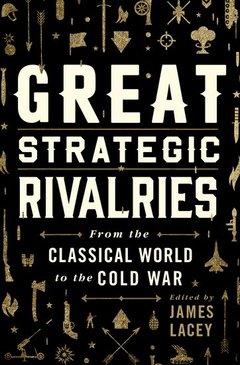Description
Great Strategic Rivalries
From the Classical World to the Cold War
Author: Lacey James
Language: English
Approximative price 57.34 €
In Print (Delivery period: 21 days).
Add to cart
Publication date: 12-2016
680 p. · 17.4x24 cm · Hardback
680 p. · 17.4x24 cm · Hardback
Description
/li>Biography
/li>
Great Strategic Rivalries explores the histories and implications of past strategic rivalries so as to bring forth lessons pertinent to today's geopolitical world. The starting assumption is that each of these rivalries holds a number of areas of commonality from which one can determine pitfalls as well as opportunities (many of them missed). For instance, even a cursory glance at history's great strategic rivals indicates that virtually all of them began as "commercial rivalries" and then transitioned into a strategic rivalry centered on military power. One could even claim a commercial interest was at the heart of the US-USSR rivalry, but this time rather than a contest over global markets each power aimed at ensuring its economic ideology (Communism vs. Capitalism) was triumphant. In addition, history tells us that such enduring strategic rivalries typically end in one of three ways: a series of exhausting conflicts in which one side eventually prevails (Rome vs. Carthage), a peaceful and hopefully orderly transition (Great Britain vs. the US at the turn of the 20th century), or a one-sided collapse (Soviet Union in 1991). The first work covering a key element of the strategic relationship between states from ancient history to the late 20th century, Great Strategic Rivalries fills a major gap in the historiography of state relations. Each chapter provides an accessible narrative of an historically significant rivalry, comprehensively covering all aspects (political, diplomatic, economic, and military) of its history. The authors -- including Barry Strauss, Geoffrey Parker, Williamson Murray, and Geoffrey Wawro -- are all renowned historians and recognized experts in their selected topics.
James Lacey is Course Director and Professor of both Strategic Studies and Political Economy at the Marine Corps War College. His previous books include The Shaping of Grand Strategy: Policy, Diplomacy, and War Diplomac, The Moment of Battle: Twenty Clashes that Changed the World, and The First Clash: The Miraculous Greek Victory at Marathon and Its Impact on Western Civilization.
© 2024 LAVOISIER S.A.S.




